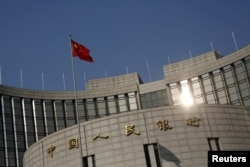The Chinese have been moving money abroad at record levels as China’s economy continues to slow, boosting real estate prices around the world while raising concerns.
In places like New York, Miami and London, Chinese investors are dominating the market for land and buildings, especially in the luxury sector.
Sam Chandan, a professor at the Wharton School of the University of Pennsylvania in the eastern U.S., said, “Chinese investors are the newest players on the scene, but they have very quickly grown to become the dominant player in those gateway markets. We have very clear examples of this. In a market like New York City, the largest hotel sale in U.S. history was a Chinese life insurance company.”
China imposes restrictions
But the flight of money has caused concerns in Beijing, which recently began a clampdown that could impede the overseas investments.
China has said it would launch a system to monitor foreign exchange businesses at banks, and that people trying to purchase more than the maximum $50,000 in foreign currency a year would be placed on a watch list.
Another obstacle may be China’s recent stock market volatility, which has left potential buyers with less cash on hand to buy property.
Terrence Oved, a lawyer with Manhattan real estate and commercial litigation firm Oved & Oved LLP, said, “With respect to many of the Chinese investors, the Chinese stock market fluctuation and the downward pressure has eliminated the paper gains of a lot of these Chinese foreign investors that has allowed them to go shopping in New York, Miami and [elsewhere in] the United States.”
He said many buyers are adopting a wait and see approach to the Chinese economy.
US banks react
Some large banks are also becoming more cautious regarding Chinese investors. International banking giant HSBC announced last month it would no longer provide mortgages to some Chinese nationals, who are already dominating real estate markets abroad. HSBC - Europe’s biggest lender - has not clarified which specific clients would be impacted by the new rules.
But while HSBC has introduced new rules that could restrict purchases, other banks are jumping in to fill the void.
The Royal Bank of Canada said it would ease its cap on mortgages to buyers without a local credit history. In the U.S., some Chinese are investing in real estate development projects to qualify for the EB-5 visa program, which gives foreign nationals green cards in exchange for investing in projects that employ 10 or more people. Real estate buyers are also drawn to the economic stability, education and rule of law of U.S. and European markets.
US real estate attractive
Spencer Levy, head of Americas Research at CBRE, said he expects foreign demand for U.S. real estate to continue. “Once you get past the volatility that we see in the market today, I expect it to increase. I think that the investment opportunities that Chinese are going to see abroad in the U.S. and elsewhere, are very strong.”
Levy says he thinks Chinese buyers will continue to buy in the U.S. because of the continued strength of the U.S. real estate market and economy. Chinese buyers used to focus on gateway markets such as New York and San Francisco, but now increasing numbers are turning to secondary markets like Houston to purchase property.









